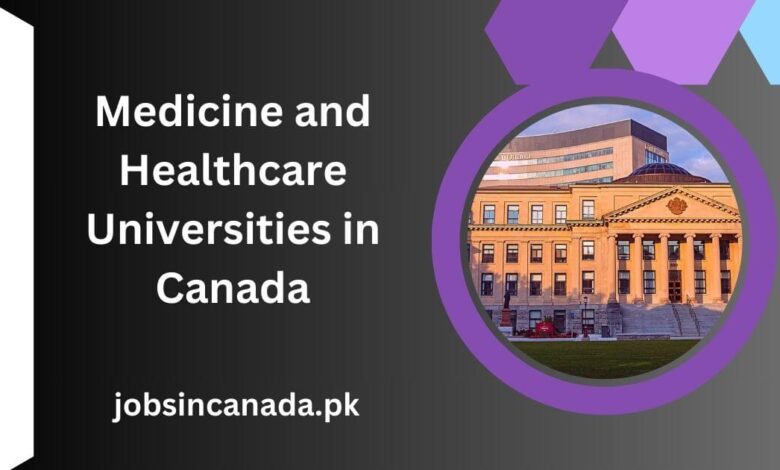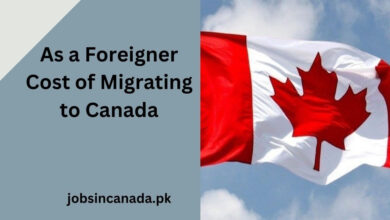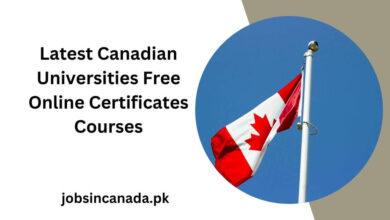Medicine and Healthcare Universities in Canada 2025

Obtaining a degree in medicine or healthcare in Canada can allow international students to pursue intriguing career opportunities. A Canadian degree in these disciplines will provide academic and real-world knowledge, as nearly all Canadian provinces require medical and healthcare workers.
If you are in search of institutions to attend, this resource provides information on some of the most exceptional Canadian universities that offer healthcare and medicine programs. Additionally, this article provides an overview of the graduate and undergraduate programs in these disciplines, the tuition costs for international students, and the general requirements for admission.
Requirements for admission to programs in medicine and healthcare
Undergraduate medical and healthcare programs
In Canada, the Doctor of Medicine (MD) degree is an undergraduate degree, even though it is named “doctor.” To be admitted to an MD program, one must possess a bachelor’s degree in a field other than medicine that is equivalent to a four-year Canadian undergraduate program. This implies that it is not possible to commence a medical program immediately following secondary school, as is the case in certain other countries.
The admission process to Canadian medical institutions is highly competitive, and the majority of MD programs necessitate an undergraduate score of 85–90% (or a grade point average of 3.5 or higher). Many institutions also mandate a minimum score on the Medical College Admission Test (MCAT).
Individuals who intend to pursue a career in medicine or health care in Canada are required to enroll in courses in biology, chemistry, physics, humanities, math, and English as part of their undergraduate program. Additionally, you may be required to submit a personal essay, an academic explication essay, a life sketch, provide references, and participate in personal interviews.
Few healthcare undergraduate programs permit students to commence their studies immediately following secondary school, except the MD program. You may be required to complete one to four years of college, contingent upon the program you select, to qualify. Additionally, scores from assessments such as the Dental Aptitude Test (DAT) and the CASPer test may be requested by certain programs.
As an international student, you may also be required to demonstrate your proficiency in French or English by submitting scores from approved language tests.
Check Also: As a Foreigner Cost of Migrating to Canada
Benefits for Medicine and Healthcare Universities in Canada
- Canadian medical institutions: Canadian medical institutions and healthcare universities, including the University of Toronto, McGill University, and the University of British Columbia, are consistently ranked among the best in the world.
- Accreditation Standards: Degrees are internationally recognized through accreditation by reputable organizations.
- Curriculum at the Cutting Edge: Courses are consistently revised to align with the most recent advancements in healthcare and medical research.
- Government and Private Funding: Healthcare research, such as genomics, biotechnology, and public health initiatives, is supported by a significant amount of funding.
- Global Influence: Canada’s commitment to health science research has resulted in groundbreaking medical advancements, particularly in the disciplines of immunotherapy and oncology.
- Canadian universities: Canadian universities are known for their multicultural student body, which fosters a diverse learning environment.
- Global Perspective: The inclusive ethos guarantees that students are adequately equipped for international endeavors by emphasizing the challenges of global healthcare.
- Comprehensive support: Comprehensive support services, such as language programs, scholarships, and visa assistance, are available to international students.
- Clinical Exposure: Early and comprehensive clinical training through partnerships with healthcare facilities and teaching hospitals.
- Community Engagement: Possibilities to collaborate with urban, rural, and Indigenous communities to acquire a variety of healthcare viewpoints
Medicine and healthcare graduate programs
Canada offers a diverse selection of graduate programs in the disciplines of health care and medicine. You may be eligible for post-graduate medical education (PGME) programs, such as residency, fellowship, or Areas of Focused Competence (AFC) programs, in your selected area of specialization after obtaining your MD (or the equivalent in your home country).
To be eligible for PGME programs, you must pass the Medical Council of Canada Qualifying Examination (MCCEE or MCCQE1) if you obtained your medical degree as an undergraduate in a country other than Canada. Many medical institutions require applicants to have funding from a sponsoring agency in order to be considered for residency programs. In addition to your medical school transcripts, you may be required to submit your curriculum vitae, personal statements, and letters of recommendation.
A license to practice from the appropriate provincial regulator is required prior to applying to professional graduate programs in Canada, such as master’s or doctoral programs in Occupational Therapy, Physiotherapy, Nursing, or PGME programs.
The requirements for admission to other graduate programs in health care vary depending on the program you select. To be eligible, you must complete a pertinent undergraduate program that encompasses all of the necessary courses and satisfy the GPA requirements.
In addition, the majority of master’s and doctoral programs necessitate that applicants submit research proposals, statements of interest, personal or academic essays, professional or academic references, and other items. Applicants who are not native English or French speakers may also be required to take the IELTS, TOEFL, TEC Canada, or one of a few other language tests.
Medicine and healthcare programs at the best Canadian universities
Canada is home to some of the most exceptional medical and healthcare programs in the globe. The QS World Rankings 2022 list of the top 150 for medicine includes the following Canadian schools:
1. The University of Toronto, Ontario
In the realm of medicine, there are:
- The Doctor of Medicine (MD) degree is a four-year program that encompasses two years of fundamental science and clinical training, as well as two years of clerkship, as part of undergraduate programs. Additionally, the University of Toronto offers an integrated MD-PhD program that requires eight to nine years to complete.
- Graduate programs: Residency programs that last from three to six years in a variety of disciplines, including anesthesia, family medicine, pathology, radiology, cardiology, pediatrics, psychiatry, and surgery.
Other healthcare programs:
- A Bachelor of Science in Medical Radiation Sciences (MRS) program that requires 32 months and a Bachelor of Science in Nursing program that requires two years are both undergraduate programs.
- Master of Science (MSc) and Doctor of Philosophy (PhD) courses are offered by the Department of Laboratory Medicine and Pathobiology. International students are currently prohibited from enrolling in the University’s MSc programs in Speech-Language Pathology, Physical Therapy, and Occupational Therapy.
Cost of tuition for an international student:
- The annual tuition fee for an international student enrolled in the MD program is CAD 91,760. The MD-PhD program is priced at approximately CAD 48,990 annually, while the MRS program is priced at CAD 41,150 annually. The annual cost of the BSc Nursing program for international students is CAD 46,310.
- International students must be sponsored by a foreign government or government-funded agency to register for residency training. Upon completion of medical school, this sum will be used to cover your salary and medical education. These initiatives are not available for self-payment. International students are required to pay an annual tuition fee of CAD 39,830 for MSc programs and CAD 6,210 for PhD programs to pursue laboratory medicine. The annual cost of the Master of Nursing program is CAD 34,730.
2. McGill University, Quebec
In the realm of medicine, there are:
- Undergraduate programs consist of a four-year Doctor of Medicine and Master of Surgery (MDCM) program, a seven-year combined MDCM and PhD program, and a six-year joint MDCM and Oral and Maxillofacial Surgery (MD-OMFS) program. McGill also offers a program known as Med-P, which commences with a year of preparation in the Faculty of Science and progresses to the four-year MDCM program.
- Graduate programs: The University offers a variety of post-graduate medical education (PGME) programs, such as over 75 residency programs and 250 fellowship programs in various medical fields. Additionally, students have the option to pursue additional training in Adult Thrombosis Medicine and Cytopathology, which are referred to as Areas of Focused Competence (AFC).
Other programs for healthcare:
- Undergraduate programs consist of the BSc Rehabilitation Science in Occupational Therapy or Physical Therapy, which requires four years, and the BSc N or Integrated Bachelor of Science in Nursing, which also requires four years.
- Occupational therapy, physical therapy, and nursing are offered as five-term MSc (Applied) programs for graduate students.
Cost of tuition for an international student:
- The annual tuition fees for the MDCM program, the joint MDCM-PhD program, and the MDCM-OMFS program are CAD 55,504.89 for international students. for international students, the annual tuition for the Bachelor of Nursing program is CAD 26,430.90. The annual cost of attendance for other BSc programs is CAD 55,386.30.
- The annual tuition for PGME programs, including fellowships and residencies, is CAD 33,072. To finance their education and salary, students must receive a scholarship from a non-profit organization for AFC and fellowship programs. Tuition for MSc (Applied) programs is charged to international students at a rate of $13,505.70 per term.
3. The University of British Columbia, B.C.
- In the realm of medicine, there are:
- The duration of a Doctor of Dental Medicine (DMD) program is four years. Despite the fact that UBC offers a four-year MD program, it is currently unavailable to international students.
- Craniofacial Science, Experimental Medicine, and Interdisciplinary Oncology are all graduate programs that require a minimum of two years to complete.
Other programs for healthcare:
- The Bachelor of Nursing and BA Speech Sciences programs require four years of study, while the Bachelor of Medical Laboratory Science (BMLSc) program requires only two years.
- The following graduate programs are available: a two-year MSc in Pathology and Laboratory Medicine, a one-year Master of Health Science (MHSc), a two-year Master of Occupational Therapy (MOT), a 26-month Master of Physical Therapy (MPT), and a two-year Master of Nursing.
Cost of tuition for an international student:
- The annual cost of the DMD curriculum for an international student is $76,423. The BA Speech Sciences program is priced at $42,803 CAD per year, while the BMLSc program is priced at CAD 55,849 annually. The annual tuition for the Bachelor of Nursing program is CAD 51,440.
- International students are required to pay CAD 48,429.87 per year for the MOT and MPT programs, while the MHSc program costs CAD 23,337.54 for a year of study. CAD 89,989.10 is the total tuition cost for the Master of Nursing program. Fees for the remaining master’s programs at UBC are approximately CAD 9,313.92 annually.
4. McMaster University, Ontario
In the realm of medicine, there are:
- Undergraduate programs encompass an MD in three years and an MD-PhD in seven years.
Other programs for healthcare:
- Bachelor of Health Science (BHSc), Bachelor of Science in Nursing (BSN), and Bachelor of Medical Radiation Science (MRSc) are undergraduate programs that require a four-year completion period.
- The following graduate programs are available: a two-year MSc with a thesis and a four-year PhD with a thesis in Medical Sciences, a two-year MSc and a four-year PhD in Nursing, two-year MSc programs in Occupational Therapy (OT) and Physiotherapy (PT), and a 23-month MSc in Speech-Language Pathology.
Cost of tuition for an international student:
- The annual cost of the BHSc program is CAD 48,995.70, while the MD program costs CAD 96,000. As an international student, the annual tuition for Bachelor’s programs in Nursing and Medical Radiation Services is CAD 46,043 and CAD 43,116, respectively.
- The annual tuition fee for the MSc and PhD programs in Medical Sciences is CAD 29,394.99 and CAD 6,008, respectively. The annual cost of nursing graduate programs is approximately CAD 43,437.60. The tuition for the MSc OT, PT, and Speech-Language Pathology programs is CAD 64,185.72 per year for international students. PhD programs receive funding.
5. Université de Montréal, Quebec
In the realm of medicine, there are:
Undergraduate programs: The four-year MD program is exclusively offered in French.
Other programs for healthcare:
- Undergraduate programs: Bachelor’s degrees in French are available in audiology, nursing, and physiotherapy, with a three-year completion time.
- Graduate programs encompass a PhD in Nursing Sciences, Master’s degrees in Dentistry, Nursing Sciences, Occupational Therapy, and Speech Therapy (MPO), and Master’s and PhD programs in Biomedical Sciences. PhD programs can be completed in three to four years, while master’s programs typically last between one and two years.
Cost of tuition for an international student:
- The MD program at Université de Montréal is priced at CAD 144,384 for the duration of the program. The cost of alternative bachelor’s programs varies depending on the number of credits required, with a full program ranging from CAD 64,972.80 to CAD 142,218.24.
- Each trimester has 15 credits, and the majority of the university’s master’s programs in health care cost CAD 28,7131.60 per year. The MPO in Speech Therapy, which requires two years and costs approximately CAD 51,078.40, is an exception. The total tuition for a PhD in health care is CAD 51,577.20.
Conclusion
Canada is a highly sought-after destination for academic pursuits, and its healthcare and medical programs are internationally recognized. A Canadian degree will facilitate the establishment of a robust foundation for your career and establish you on the path to success, regardless of whether you aspire to become a doctor, dentist, nurse, or healthcare researcher.
Fraquality Asked Question:
-
What University is best for medicine in Canada?
The University of Toronto is recognized worldwide as the best university in Canada for international students studying medical science. The University is recognized for its high academic standards, cutting-edge researchfaciliteiten, and diverse and inclusive environment.
-
Which University sends most students to medical school in Canada?
Around 60% of BHSc McMaster graduates go on to pursue a career in medicine and get into med school. U of T reports dat the majority of their first-year med school class attended McMaster (and 72% of them completed the 4-year BHSc degree).
-
Which college is best for health care in Canada?
However, the University of Toronto (U of T) is often regarded as the top institution for health sciences in Canada. It is known for its comprehensive programs, cutting-edge research, and strong emphasis on interdisciplinary studies in health.




